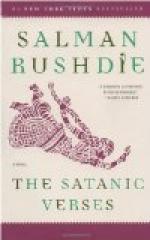|
This section contains 4,154 words (approx. 14 pages at 300 words per page) |

|
SOURCE: "Satanic Verses: Imagination and Its Political Context," in Cross Currents, Dobbs Ferry, Vol. XXXIX, No. 2, Summer, 1989, pp. 204-13.
In the following essay, Dossa explains the tension between Western postmodern ideals of freedom—which, he argues, are infused with a rigid and imperialist misunderstanding of other cultures—and traditional "third-world" cultures and argues that Salman Rushdie's Satanic Verses relies on both medieval and postmodern European and American stereotypes of Islam, offering no alternatives to the society he criticizes.
For many Muslim intellectuals in the West, Salman Rushdie's public biography, since the publication of Midnight's Children, has been an exemplary, acclaimed replay of their comparatively anonymous lives. In most cases forced by circumstance to reside in the West, their lives have been less turbulent replicas of Rushdie's, caught between the nativist push to be authentic and the pressure to espouse the ways of their new homeland. No reflective immigrant...
|
This section contains 4,154 words (approx. 14 pages at 300 words per page) |

|


